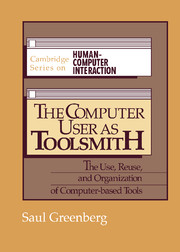Book contents
- Frontmatter
- Contents
- List of figures
- List of tables
- Foreword
- Acknowledgments and dedication
- 1 Introduction
- 2 Studying UNIX
- 3 Using commands in UNIX
- 4 Techniques for reusing activities
- 5 Recurrent systems
- 6 Reuse opportunities in UNIX csh – potential and actual
- 7 Principles, corroboration, and justification
- 8 Organizing activities through workspaces
- 9 A workspace system: description and issues
- 10 Conclusion
- Appendix A A sample trace
- Appendix B Summary statistics for each subject
- References
- Author index
- Subject index
Appendix A - A sample trace
Published online by Cambridge University Press: 26 May 2010
- Frontmatter
- Contents
- List of figures
- List of tables
- Foreword
- Acknowledgments and dedication
- 1 Introduction
- 2 Studying UNIX
- 3 Using commands in UNIX
- 4 Techniques for reusing activities
- 5 Recurrent systems
- 6 Reuse opportunities in UNIX csh – potential and actual
- 7 Principles, corroboration, and justification
- 8 Organizing activities through workspaces
- 9 A workspace system: description and issues
- 10 Conclusion
- Appendix A A sample trace
- Appendix B Summary statistics for each subject
- References
- Author index
- Subject index
Summary
A portion of a trace belonging to a randomly selected expert programmer follows in the next few pages. The nine login sessions shown cover slightly over one month of the user's UNIX interactions, and include 155 command lines in total.
As mentioned in Chapter 2, all trace records have been made publicly available through a research report and an accompanying magnetic tape (Greenberg, 1988b). This report may be obtained from the Department of Computer Science, University of Calgary, or the author.
Because the raw data collected is not easily read, it was syntactically transformed to the listing presented here. The number and starting time of each login session are marked in italics. The first column shows the lines processed by csh after history expansions were made. The current working directory is given in the middle column. Blank entries indicate that the directory has not changed since the previous command line, and the “∼” is csh shorthand for the user's home directory. The final column lists any extra annotations recorded. These include alias expansions of the line by csh, error messages given to the user, and whether history was used to enter the line. Long alias expansions are shown truncated and suffixed with “…”.
- Type
- Chapter
- Information
- The Computer User as ToolsmithThe Use, Reuse and Organization of Computer-Based Tools, pp. 164 - 168Publisher: Cambridge University PressPrint publication year: 1993

